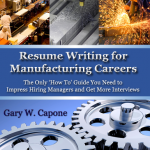I read two resumes today with accomplishments that appeared to have nothing in common. One is from a senior manufacturing executive and the other is from an individual in the Navy. The scope and type of the accomplishments are vastly different, and yet, they both are impressive.
The Manufacturing Executive
The accomplishment on the resume provided specific results and a description of how they were achieved:
Reduced annual labor costs by $1.75 million through standardization of work methods, instituted employee productivity reporting system, improved product-flow, realigned supervisory responsibilities, and implemented a comprehensive employee training program
This is an impressive accomplishment. Nearly $2 million in labor savings through a number of changes. Any manufacturing manager would want an accomplishment like this on their resume. Most people don't have accomplishments this significant, though.
The Transitioning Sailor
The accomplishment from the individual transitioning from the Navy also provided specific results and a description of how they were achieved:
Saved over $7,000 by expertly using outside government sources to provide services previously taken from activities budget.
After reading about a $1.75 million in savings, $7,000 appears insignificant. You may be thinking that it is pointless to write about saving a few thousand dollars. For this individual, the accomplishment is impressive and may be more impressive than the accomplishment from the manufacturing executive.
The reason the accomplishment is impressive has nothing to do with the dollar amount. Going by dollars, there's no comparison between these two accomplishments. Dollars saved isn't the only factor. We also have to look at the role of the individual and the potential for savings. If the CEO of GE, IBM or Exxon listed an accomplishment of saving $1.75 million, it would not be impressive. These companies have sales in excess of $100 billion dollars. A million is insignificant to the scope of company.
For the transitioning sailor, there is very little opportunity to generate cost savings. This individual was enlisted and at a lower level. Very few of his peers can identify any specific cost savings they have delivered. This is what makes the accomplishment significant.
In your career, you may not have had the opportunity to save millions of dollars. This does not mean you do not have significant accomplishments. Review your background for situations where you were able to make a contribution beyond your basic expectations. These accomplishments could involve saving money, but they could also relate to other aspects of your job. Have you improved a process? Did you help a company become more efficient? Did you do something that elevated customer service levels? There are a wide variety of ways people contribute to their employers. Look for ways you have contributed and highlight these on your resume.
Newly published in 2010: Get the best book for Manufacturing Resumes

